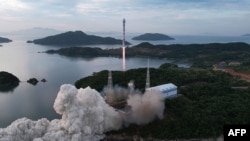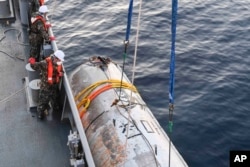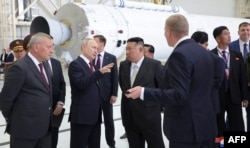북한이 10월에 군사정찰위성 3차 발사를 하겠다고 공언한 가운데 전문가들은 이번에도 성공 여부를 장담할 수 없다고 진단했습니다. 북한이 러시아로부터 실패 원인에 대한 조언과 산업 기반 육성 등 도움을 받을 가능성도 제기했습니다. 조상진 기자가 보도합니다.
미국의 미사일 및 위성 전문가들은 북한이 공언한 10월 3차 정찰위성 발사와 관련해 북한의 위성 개발 수준이 여전히 상당 부분 베일에 싸여 있다고 지적했습니다.
북한의 3차 위성 발사 성공 여부를 가늠할 정확하고 충분한 정보가 거의 없다는 평가입니다.
미사일 전문가인 반 밴 디펜 전 국무부 수석부차관보는 4일 VOA와의 전화통화에서 “우리는 실패의 원인이 무엇인지 확실히 알지 못한다”면서 북한의 주장 외에는 지난 1, 2차 실패의 원인을 판단할 근거가 부족하다고 지적했습니다.
[녹취: 밴 디펜 전 부차관보] “We don't know for sure what the actual causes of the failures were. We just have what the North Koreans say but assuming what they say is correct, apparently the in the second flight the second stage operated properly unlike the first flight and the third stage even started to operate. But again, since we don't know for sure what the issues were with the previous launches and because for any given launch, something else could go wrong you never know. So there's always a possibility of failure you know, even of our launches. So you know so there's really no way to put, you know, a probability of success on this next launch.”
밴 디펜 전 부차관보는 1차 발사의 오류를 2차 발사에서는 수정했다는 북한의 주장을 액면 그대로 믿는다면 2차 발사의 오류도 비교적 짧은 시간에 수정할 수 있는 간단한 문제일 수 있다면서도 북한의 주장을 그대로 믿기는 어렵다고 지적했습니다.
특히 매우 높은 발사 성공률을 갖고 있으며 여러 차례 시험 발사를 하는 미국 같은 선진국들도 항상 실패의 가능성은 존재하는 것이 위성 발사의 분야라면서, 관련 경험이 적고 발사 횟수도 세 번밖에 되지 않는 북한이 성공할 것으로 보기는 어렵다고 말했습니다.
우주 전문가인 조너선 맥도웰 하버드 스미스소니언 천체물리학센터 박사도 1,2차 실패 원인에 대한 북한의 주장이 사실이라면 비교적 해결이 쉬운 간단한 엔지니어링 문제라고 평가했습니다.
다만 위성 발사는 복잡하고 민감한 기술을 필요로 하며 언제든 다른 문제가 발생할 가능성이 있다면서, 1, 2차 때 문제가 없었다고 하더라도 설계나, 조립, 디자인 등에서 잠재적 도전 과제가 나올 수 있다고 지적했습니다.
[녹취: 맥도웰 박사] “You can have design problems that you were just lucky they didn't catch you before or you can have assembly problems that the design is fine but the rocket was assembled incorrectly. And so both of those are potential challenges. And so you can never be sure and particularly when you don't have a lot of experience. Once you get the flight rate up once you've launched 10 or 20 or 30, you start to have confidence in the system you start to learn what you can and can't get away with. They're still in the early stages. So it's a very difficult problem they're trying to solve.”
맥도웰 박사는 “특히 경험이 많지 않은 경우에는 성공을 절대 확신할 수 없다”면서 최소 10회에서 30회 정도 발사해 비행 성공률을 높여야 시스템에 대한 자신감이 축적될 수 있다고 설명했습니다.
그러면서 “현재 북한은 아직 초기로, 매우 어려운 문제를 해결하기 위해 노력하고 있는 정도의 단계”라고 진단했습니다.
앞서 북한은 지난 5월 31일 군사정찰위성 첫 발사에 도전했다가 실패했고, 8월 24일 2차 시도에 나섰지만 역시 성공하지 못했습니다.
북한 당국은 1차 발사의 실패 원인에 대해 ‘1단계 분리 후 2단계 엔진의 시동 비정상에 따른 추진력 상실’이라고 밝혔고, 2차 때는 ‘3단계 비행 중 비상폭발 체계 오류’라고 주장한 바 있습니다.
이에 따라 북한은 “원인을 철저히 규명하고 대책을 세워 10월에 3차 정찰위성 발사를 단행할 것”이라고 공언했습니다.
전문가들은 북한이 제시한 1, 2차 실패 원인처럼 매우 간단한 문제라면 단기간에 자체 해결이 가능할 수 있다는 데 대체로 동의했습니다.
하지만 기본 역량 부족이나 설계 오류 등 다른 문제라면 외부의 도움 없이 단기간에 문제 해결이 불가능할 것이라고 입을 모았습니다.
[녹취: 슈무커 박사] “I attended many years ago, I was in a group to find out why a satellite launcher failed. And they brought together people from many countries in Europe of course to find out what could have been the cause. And finally we couldn't trace it really to something but we found out that it is a likelihood just a likelihood not to prove. The likelihood that something was not correctly done during the assembly. This was it. The only thing which we could find out. This is a big problem because when you go to the next launch you have to since you don't know you have to look at all the procedures of course for assembly but you may face the same problem because you didn't find the real cause of the problem and this is one of the big problems. They have to provide a complete new system. No repair no repair. Except it's a very simple thing for example if a valve didn't work or something like this.”
1990년대 이라크에 대한 유엔특별위원회(UNSCOM)의 무기사찰관을 역임했으며, 북대서양조약기구(NATO·나토)와 독일 국방부 미사일 프로그램 고문을 지낸 로버트 슈무커 박사는 VOA에 과거 독일의 위성 발사 실패 분석을 위한 평가팀에서 활동할 당시 유럽 각국에서 온 전문가들이 실패 원인을 파헤쳤지만 얻은 결론은 “조립 과정에서 무엇인가 올바르게 수행되지 않았을 가능성이 있다”는 것이 전부였다고 말했습니다.
위성과 미사일 분야 선진국조차 발사 과정에서 발생한 실제 실패 원인을 단기간에 찾는 것은 매우 어려운 문제라는 것입니다
그러면서 “북한이 설계나 조립 자체에 문제가 발생했을 경우에는 완전히 새로운 시스템을 제공해야 하며, 수리나 보완을 한다는 것은 불가능하다”고 지적했습니다.
슈머커 박사는 그러면서 최근 북러 정상회담에서 김정은 국무위원장과 블라디미르 푸틴 대통령이 위성 분야 협력을 언급한 것을 상기시키며, 단기간에 북한의 실패를 바로잡기 위한 러시아의 조력이 있을 가능성을 제기했습니다.
[녹취: 슈무커 박사] “Then they if this is a Russian system the thing is the most important thing if you test if it is a test launch you have to instrument the system the rocket you have to have pressure transducers temperature measurements, measure tension in the tankage and the tank material and all this this has to be transmitted to the ground to get information if something fails. Because if you have a failure you have to find out what was the cause of the failure. And this is very difficult. The missile is flying and you see it's not working and then what is the reason what happened to in which component and so on, but it's a very difficult situation and therefore you need those who designs the whole system. You need people and then therefore if this comes from Russia then they have to have Russian people with them from the design bureau from the system design bureau not someone who you have to know what is going on in the system.”
슈무커 박사는 북한이 1,2차 정찰위성 발사에 사용한 로켓은 러시아제 RD-250과 매우 유사하다면서, 관련 기술을 다양한 경로를 통해 이미 러시아로부터 제공받은 것이라고 지적했습니다.
따라서 로켓의 압력 변환기 온도 측정이나 연료 저장 탱크의 장력과 재질 등에 대한 측정 등 실패 원인 파악을 위한 주요 정보가 필요하다면서, 이를 위해서는 전체 시스템을 설계한 러시아의 관련 전문가들이 반드시 있어야 한다고 분석했습니다.
그러면서 러시아가 관련 전문가들을 파견해 북한의 지난 위성 실패의 원인 분석에 도움을 준다면 비록 단기간이라도 문제 해결에 큰 도움이 될 수 있을 것으로 관측했습니다.
우주 관련 비정부기구인 ‘시큐어 월드 재단’의 브라이언 위든 우주 프로그램 계획 국장도 러시아와 북한의 위성 분야 협력 시사는 단기적 협력보다는 중장기적 협력에 초점이 맞춰져 있다면서도, 지난 실패 원인에 대한 ‘원포인트 조언’은 분명 효과가 있을 것이라고 말했습니다.
[녹취: 위든 국장] “There's first the fact of getting the satellite into a stable orbit. And that's proved challenging for North Korea in the past. But even if that happens there's this other question of whether or not the satellite will actually function. And North Korea has had many problems with that in the past as well. And then on top of that there's the question of they effectively can the satellite actually do a useful mission and be able to relay information back to North Korea. If it wanted to Russia has deep technical expertise in rockets, space launch vehicles and satellites. So there might be a scenario where they could help improve the reliability of North Korean launch vehicles. One-point lessons can clearly be effective.”
미 전략사령부 합동우주작전센터(JSPOC)에서 궤도 분석 프로그램 책임자로 근무했고 공군 대륙간탄도미사일(ICBM) 작전 수립에 참여했던 위든 국장은 “북한은 우선 위성을 안정된 궤도에 진입시키는 것이 급선무”라면서 북한이 지난 4월 공개하고 1, 2차 발사에서 사용한 ‘천리마’ 발사체가 궤도 진입 자체에 문제를 겪고 있다는 점을 꼬집었습니다.
또한 위성이 궤도에 진입하더라도 실제 작동할지 여부는 또 다른 문제라면서, 과거 광명성 4호 등 발사에 성공했지만 위성으로서의 기능을 제대로 하지 못한 사례도 지적했습니다.
그러면서 “러시아는 로켓과 우주 발사체, 인공위성에 대한 깊은 기술적 전문성을 갖고 있으며, 따라서 북한 발사체의 신뢰성 향상에 도움을 줄 수 있는 시나리오가 있을 것”이라고 내다봤습니다.
조너선 맥도웰 박사도 북한이 현재 가장 어려움을 겪는 분야는 위성 자체의 문제보다는 위성의 제대로 된 작동이나 운영 방법을 파악하고 조립 과정에서 발생하는 실수를 줄이는 것 등일 것으로 관측했습니다.
[녹취: 맥도웰 박사] “It's not so much the hardware as the procedures that they need to learn how to check that you've assembled it right how to check that things are working right before you launch. And that can be a fairly quick conversation but if it tells you something that oh okay yeah we need to be careful about this that we hadn't thought of then that can be very valuable. I think the thing that they would want on the missile side is heat protection systems. That's an advanced technology that they may not have that's an example but whether the Russians will give them that or not I don't know.”
맥도웰 박사는 북한으로서는 미처 생각하지 못했던 부분에 대한 정보나 실패 사례를 위성 분야 선진국인 러시아가 알려준다면 매우 귀중한 자산이 될 것이라고 말했습니다.
그러면서 북한이 미사일 분야에서 러시아로부터 원하는 것은 극초음속 미사일과 대륙간탄도미사일(ICBM) 분야에서 미사일 내부를 강한 열로부터 보호하기 위해 사용되는 ‘열 보호 시스템’ 등 자신들이 아직 갖지 못한 기술일 것으로 전망했습니다.
전문가들은 또 정찰위성과 탄도미사일 발사 기술이 매우 유사함에도 불구하고 과거 탄도미사일 발사에 여러 차례 성공한 북한이 위성 발사 성공에 어려움을 겪는 것은 위성 발사가 세부 단계에서 더 정교한 기술을 요구하기 때문이라고 말했습니다.
[녹취: 위든 국장] “While they are similar technologies they're pretty different in employment. A ballistic missile typically fires for a shorter period of time and especially short range ballistic missiles. They just need to impart a certain velocity on the object. A space launch vehicle needs to burn for a much longer time and needs to stage through multiple segments of the rocket successfully. Because you have to boost a satellite to a much higher speed to get to orbit. And in the process of doing that longer burn and all of that staging you have to be very precise in both the burns and the direction to place the satellite in the orbit you want it to be in.”
브라이언 위든 국장은 “탄도미사일은 일반적으로 짧은 시간 동안 발사되고, 물체에 일정한 속도만 부여하면 된다”면서, 반면 “위성 같은 우주 발사체는 훨씬 더 오랜 시간 연소해야 하고 로켓의 여러 단계를 성공적으로 통과해야 한다”고 설명했습니다.
이어 “궤도에 진입하기 위해서는 위성에 훨씬 더 빠른 속도로 추진력을 가해야 한다”면서 “긴 연소 시간을 유지하고 모든 단계 과정에서 위성을 원하는 궤도에 배치하기 위해서는 모든 측정값이 매우 정확해야 한다”고 지적했습니다.
그러면서 정찰위성 발사체 분야에서 성공이라고 부를 만한 성과를 얻게 된다면, 이는 탄도미사일 발사 분야에서도 한 단계 업그레이드될 수 있는 만큼 우려 사안이 될 것이라고 평가했습니다.
전문가들은 북러 간 위성 분야 협력은 단기적 기술 이전과 교류 못지않게 장기적 관점에서 큰 우려 사안이 될 수 있다고 지적했습니다.
미국 매사추세츠 공과대학(MIT)에서 탄도미사일 방어 분야를 연구하는 씨어도어 포스톨 명예교수는 최근 북러 정상회담에서 언급한 ‘위성 분야 협력’은 위성 관련 산업 기반 전체에 대한 지원에 더 방점이 찍혀 있었을 것으로 해석했습니다.
[녹취: 포스톨 교수] “The problem they have is they don't have a vast industrial base. So there are lots of things that they have to get from outside like the rocket motors. The rocket motor they're using was tested over 2000 times before it was actually operational 2000 each time you throw away the rocket motor that you tested you know because, you know, so that, besides requiring the expertise, expert engineers you can't just do it with you need a vast industrial capacity.”
포스톨 교수는 “북한의 문제는 위성 관련 산업 기반이 없다는 것”이라면서, “그래서 로켓 모터처럼 외부에서 구해야 하는 것들이 많다”고 말했습니다.
그러면서 북한은 장기적으로 관련 산업을 키울 수 있는 전문 지식과 전문적 기술자를 바탕으로 방대한 산업 역량을 구축하길 원할 것이며, 러시아의 도움은 북한의 미사일 산업 기반 전체의 성장에 기여할 수 있는 만큼 우려스러운 일이 될 것이라고 지적했습니다.
VOA 뉴스 조상진입니다.











Forum